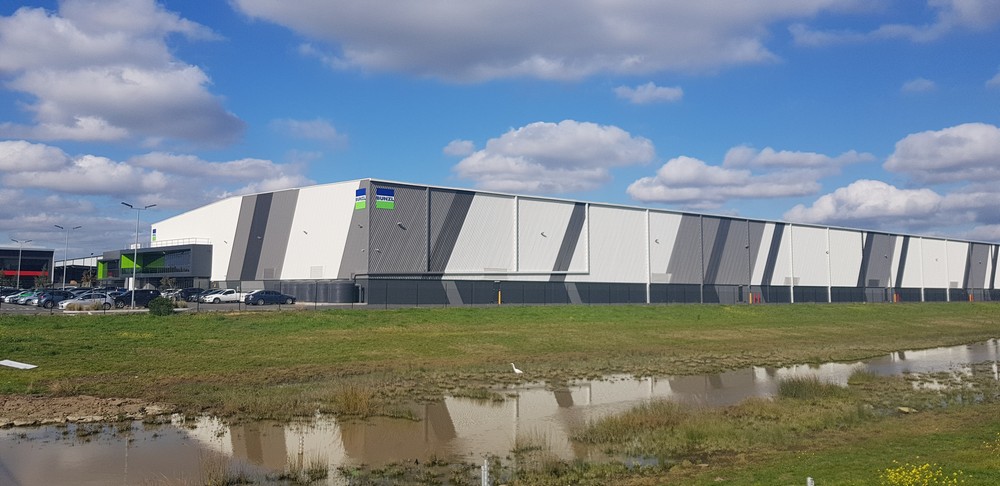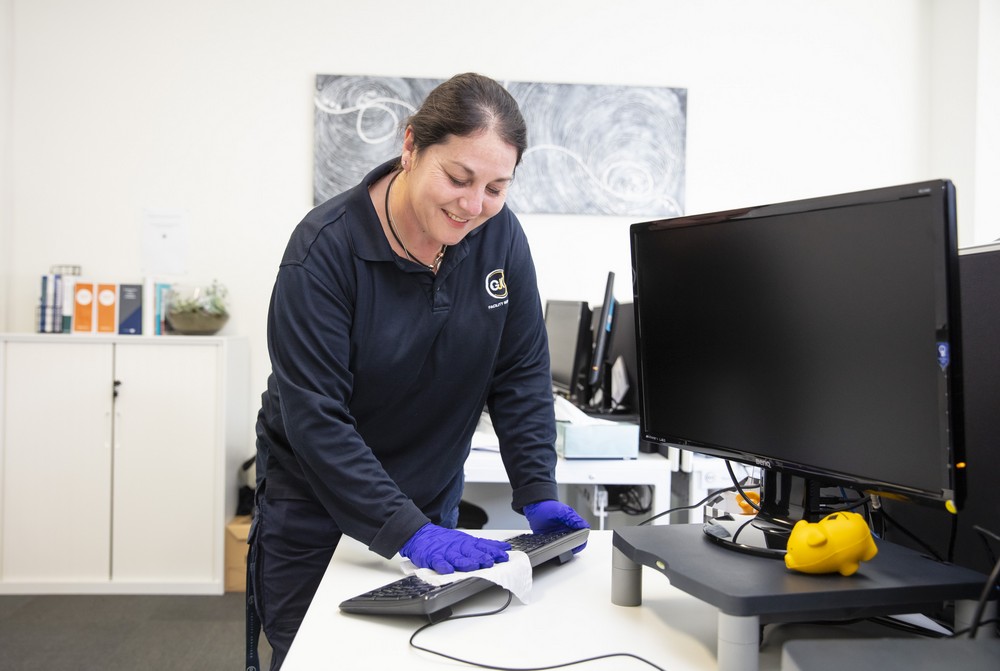
“From the beginning of COVID-19 the Bunzl leadership team was determined not to become a victim of the environment we were in,” explains Lance Ward, Managing Director of Bunzl Australia and New Zealand.
“We decided to think differently, act differently and behave differently. We made the purposeful decision to thrive in disorder.”
It’s this agility and adaptability that has led Bunzl Australia and New Zealand to continue to deliver innovation, efficiency and supply chain continuity across its key sectors – healthcare, cleaning and facility management, hospitality, retail, and food processing and industry – and to its customers.
“The work the industry is doing in the fight against COVID-19 is no mean feat. For us at Bunzl, our role has been to assist customers with our expertise and experience to help create clean and safe outcomes for their clients.
“Together, that is helping reduce the burden on the healthcare system, flatten the curve, and mitigate the spread of the virus,” says Ward.
Key to Bunzl’s success has been the organisation’s focus on specialisation. At the beginning of the year staff across Australia and New Zealand completed the ISSA Accredited Auditing Professional course.
More recently team members from Bunzl’s dedicated cleaning and hygiene team – renamed the Clean Recovery Team (CRT) – completed the GBAC Fundamentals course.
Clean Recovery Team (CRT)
The ISSA Accredited Auditing Professional course is designed for those looking to enhance their knowledge and skills around quality assurance and building audits.
“At the onset of COVID, our priority was to keep our people healthy and our facilities safe,” explains Greg Crisp, Sector Manager Facility Management at Bunzl.
“The ISSA Accredited Auditing Professional course enabled our team to gain a greater understanding into our clients’ operational realities and be able to make tailored recommendations to suit their needs.
“In addition, we were also able to use the auditing knowledge from the course to examine our own existing operations and facilities to ensure the health and safety of staff.”
Among the recommendations Bunzl implemented a divided workforce model, segregating warehouse, and office staff to minimise any risk of potential cross-infection if an outbreak occurred plus introduced new cleaning and high-level disinfection standards based on global best practice processes on-site.
Bunzl also diverted its resources from its hospitality sector and deployed them into product management, as well as its retail, cleaning and hygiene and healthcare sectors, to retain as many staff as possible during the crisis.
The team completed GBAC Fundamentals course from the Global Biorisk Advisory Council (GBAC), a division of ISSA, which teaches cleaning professionals to prepare for, respond to, and recover from biohazards in the workplace.
Participants learn infection and contamination control measures for infectious disease outbreak situations such as the novel coronavirus (SARS-CoV-2). Bunzl has since almost doubled the size of the CRT, including in New Zealand, since its relaunch earlier this year, taking the total number of team members to 16.
“With our [ISSA] qualifications, team experience, and manufacturer support, our CRT team has been able to work with our clients on a consultative basis to help with what they require for their operations in this COVID environment,” explains Crisp.
“Our team has worked on providing products and systems that customers have an immediate need for, and it has helped to be able to promote products that become part of our clients’ COVID-safe plan such as hand sanitising and high level disinfecting through to cleaning tools and equipment and training and support.”
The trans-Tasman team hosts weekly Zoom meetings, where key manufacturers are also invited to join to discuss their products in more technical detail, which Crisp says ensures, from a supply viability position, team members are up to date with the latest product information and availability.
“We have 150 account managers, so the design of CRT is for those team members to go back into the Bunzl branches and their teams, as well as customers, and provide correct, compliant information.
“The consultancy aspect of the CRT means that we are re-directing back to regulatory authorities, working with key manufacturers, and making sure product claims are verified and fit for purpose for customers.”
The newly expanded specialist team has also recently launched a new internal program, ‘The New Way of Working’ focused on engaging with customers in remote locations and high-risk environments, such as those in isolation such as hospitals and aged care. In addition, the CRT has also developed a product-based training program, ‘Work Well, Work Safe’, dedicated toCOVID-19 specific product and service solutions.
Bunzl has also continued to leverage its global footprint. The company operates in 29 countries across four continents. Bunzl Australia and New Zealand is the largest division with a national network of more than 50 warehouse and office facilities around Australia and two in New Zealand.
The Bunzl Global Cleaning and Hygiene Collaboration Group was established more than five years ago, with Crisp the Oceania representative.
“The global group has been really important throughout COVID-19 because we have been able to use it as a platform for product innovations and developments,” explains Crisp.
One such product is Total 360 by The Clorox Company, first introduced to the team by Bunzl Canada, it became one of the first to be registered with the Therapeutic Goods Administration (TGA) in Australia for its claims against COVID-19.
“The right information and qualified support have become more important than ever and COVID has proven that there is a real appetite for innovative products.”

Supply chain capability
“At Bunzl, we say we are in the ‘change business’ and we’re always adapting and modifying our company,” explains Ward.
“I’m proud, but not surprised, at how our people have performed throughout the crisis.
“‘Pivot’ has been a buzz word in recent months, but we really did, and still do that. Once we had a strategy in place to ensure the health and safety of our people, we quickly switched our attention to supply chain continuity and offering innovation to our customers.”
A week following the outbreak of panic buying toilet paper that saw supermarket shelves emptied across the country Bunzl was inundated with enquiries.
“Our supply chain team engaged with our strategic partners daily and started producing daily forecasts in addition to increasing stock holdings.
“Our sales team also wanted to ensure our customers were serviced because that would create a strategic advantage for our commercial cleaning companies and our facilities management.
“We turned down new business to make sure we serviced our customers first, and it was clear to us not everyone was doing that.
“The customer feedback our team received has been outstanding and for us it has resulted in the expansion of our relationships and the signing of new contracts ahead of contract renewals. From these events, our customers understand the value of our supply chain capability, but most of all our integrity.”
Faced with a similar challenge of global personal protective equipment (PPE) shortages, Bunzl once again provided tailored solutions for its customers.
“We quickly consulted with our customers and asked them what they needed. We then secured additional supply and sources, and invested in product design, innovation and accreditation.”
“For a multi-million dollar order we were able to source the raw material, check the technical specs in our own labs, put it into the manufacturer and have our QA team factory checking and then loaded it on the aircraft making us able to deliver into NSW and Victoria within three weeks.
“That helped us understand that our end-to-end supply chain is why our customers value what we can do. At a time when there was a global shortage of critical PPE, cleaning and hygiene products it was imperative we made decisions quickly with our partners, suppliers and customers to ensure stocks were secured.”
Reimagining the new normal
“There is a lot of research that examines how customers are likely to engage over the next five years, says Ward, “and the view is that communication will be accelerated because of the environment we’re currently in.
“The research suggests this acceleration is also being driven by a new generation of buyers entering the market. Many of which will research products, not in the traditional way of calling an account manager, but instead will go online and be much more informed by the time they engage with the vendor.
“This new generation of buyers are going to want a partner that can add value to the information they have already gathered.
“For example, the challenge cleaners have is the cost of labour, not the cost of materials. If materials or equipment can help them reduce the cost of labour, then it is our role is to bring those solutions to them.”
Ward say as a collective, the cleaning industry needs to start “reimaging the new normal.”
“In an environment where remote working is going to become more prevalent, and where workplaces or where people congregate such as healthcare, aged care, or sporting venues, we as an industry need to be able to create a safe environment where workers and guests feel confident.”
According to Ward, COVID-19 has highlighted the need for security in the supply chain.
“Facility managers and commercial cleaning are going to expect their supply chain partners to focus on several things: getting better at predicting and responding to changing demand; partnering with them to protect and defend existing clients whilst being involved in helping them grow their business as well; and being consistent and agile at the same time.
“Our job is to help reduce labour costs while getting improved outcomes. Contract cleaning isn’t about managing suppliers, it is about leading and developing people on the ground and ensuring the best and safest outcomes for clients. Their momentum is built by focusing on the front end, not the back end.
“Cleaners that we work with, and who we have been working with during COVID, that are growing, are showing these traits. They are client and front end focused and they’re coming to us and asking us for innovation, simplification, and focusing on what their ‘to be’ list is rather than their ‘to do’ list is.”
Ward also anticipates a “momentous shift” from customers going forward in the increased awareness of social responsibility, modern slavery, and sustainability.
“This is an opportunity for the cleaning industry to reposition itself. We at Bunzl want to act responsibly by considering our social and environmental impact. This is an area we can also help our customers in the cleaning and hygiene sector help their clients.”
This article first appeared in the September/October issue of INCLEAN magazine
Comment below to have your say on this story.
If you have a news story or tip-off, get in touch at info@3.106.117.80.
Sign up to INCLEAN’s newsletter.






Gary Oskay on: Industry Leaders Forum: Wayne Hill, CEO, RapidClean Group
John Ford on: Industry Leaders Forum: Joe Camilleri, Managing Director, Central Cleaning Supplies
Jasmine Soh on: Empowering the Oceania Cleaning and Hygiene Industry: INCLEAN Unveils Its Unified Magazine